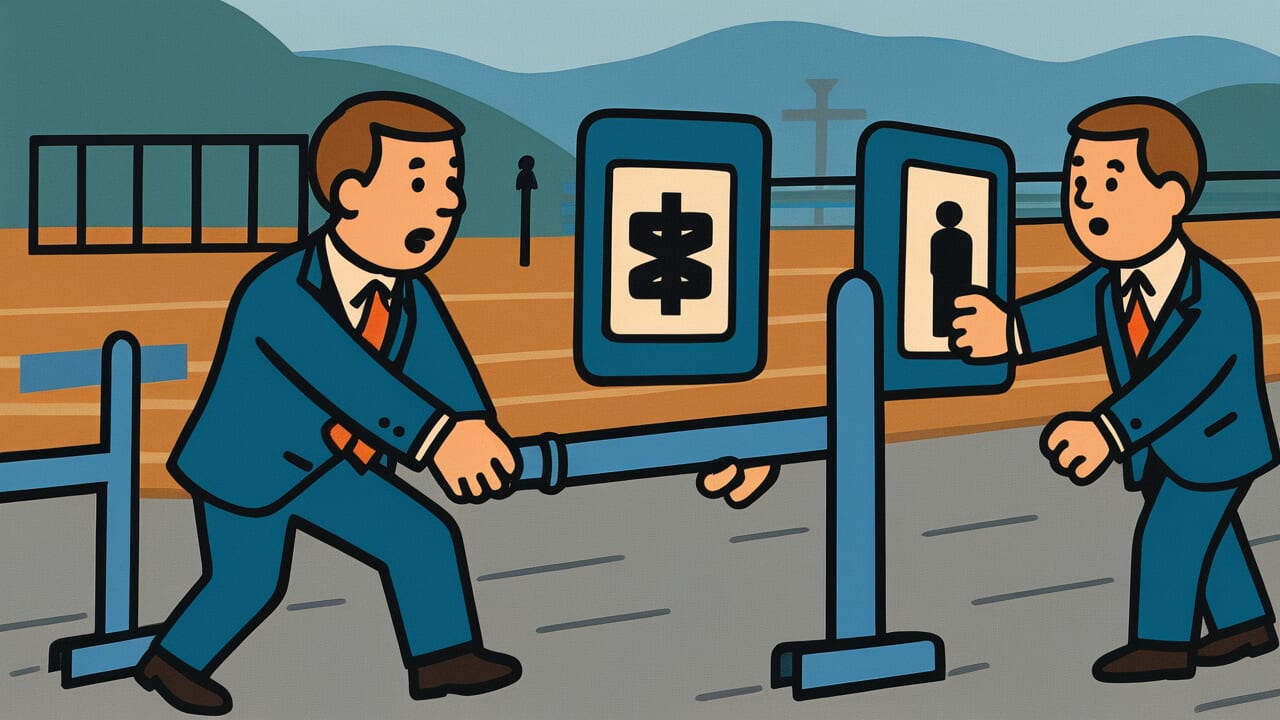How to Read “When one man guards the gate, ten thousand men cannot open it”
Ippu kan ni atareba banpu mo hiraku nashi
Meaning of “When one man guards the gate, ten thousand men cannot open it”
This proverb means that if one person defends a strategic point, even a large army cannot break through.
When a brave person guards an important location—a narrow point that enemies must pass through—they can hold back any number of attackers.
People use this expression to convey a strategic truth. Terrain and position can overcome numerical disadvantage.
Today, this proverb applies beyond military situations. It’s used in business and organizational management too.
For example, it explains the importance of placing the right person in a key position. It also describes how a small elite team can control critical points effectively.
This proverb teaches us something important. Quality matters more than quantity. Where you defend and who defends it are more crucial than sheer numbers.
Origin and Etymology
This proverb likely comes from ancient Chinese classics. The most accepted theory traces it to the Chinese phrase “一夫当関、万夫莫開.”
These words emerged from a specific geographical reality—mountain passes that served as gates.
In ancient China, narrow passages between mountains were crucial military positions. These “gates” often had steep cliffs on both sides.
Large armies had no choice but to advance in single file through such places. A single brave soldier standing there could stop tens of thousands of enemy troops.
We don’t know exactly when this expression reached Japan. It likely spread among samurai and intellectuals during periods when Chinese classical learning was highly valued.
During Japan’s Warring States period, defensive battles at mountain castles and mountain passes were common. The situation described in this proverb was a real tactical reality.
Defense by small numbers using terrain was strategically important throughout Japanese history. This is probably why the proverb resonated so deeply.
The power of the words themselves and the strategic wisdom behind them explain why this saying has been passed down through generations.
Usage Examples
- If he handles quality control for this project, it’s like “when one man guards the gate, ten thousand men cannot open it”—no problem will slip past him
- Rather than expanding the sales department, placing talented people at the customer service window is more effective—truly “when one man guards the gate, ten thousand men cannot open it”
Universal Wisdom
This proverb has endured because it touches on an eternal theme in human society—quality versus quantity.
We tend to be overwhelmed by large numbers. Countless enemies, massive workloads, problems coming one after another. In such moments, people feel powerless.
But this proverb offers a different perspective. It’s not about numbers—it’s about choosing the right place. Not about force—it’s about using wisdom.
Throughout human history, examples of the few defeating the many are countless. This wasn’t mere luck.
It happened because of insight to identify key positions and determination to defend them. This wisdom also gave hope to the weak facing the strong.
Even in overwhelmingly disadvantageous situations, there’s a chance of victory. If you stand in the right place, in the right way, you can believe in that possibility.
Today, we constantly face choices. If we try to defend everything, we end up defending nothing.
Where should we concentrate our limited resources? That decision determines victory or defeat.
This proverb isn’t just about tactics. It’s about life wisdom—identifying what truly matters, your essential “gate,” and pouring all your energy into it.
Our ancestors embedded this universal truth about focus and concentration into these powerful words.
When AI Hears This
In network theory, special points that control overall flow are called “bottlenecks.” What’s interesting is that a bottleneck’s influence depends on its position, not its inherent strength.
Consider internet data communication. Even with countless servers worldwide, certain locations exist where “you must pass through here to proceed”—like undersea cable landing points.
Control that single point, and you can completely stop information flow to tens of thousands of computers beyond it.
In other words, one guard can stop ten thousand attackers not because the guard is strong, but because the location has the property of “mandatory passage.”
Even more fascinating is what network science research reveals about “asymmetric attack resistance.”
Networks continue functioning even when many randomly selected points are destroyed. But when one critical point is targeted, the entire system paralyzes.
In actual measurements, it’s not uncommon for just 5 percent of important nodes to control 80 percent of total flow.
This proverb also offers hope to defenders. Protecting a vast territory requires enormous resources.
But identify and secure just one critical passage point, and you can achieve great effects with minimal force.
In modern cybersecurity too, the mainstream strategy isn’t defending everything. It’s identifying critical points where you say “this absolutely must be protected.”
Lessons for Today
This proverb teaches modern people the courage not to try to have everything. Your time, energy, and money are all limited.
Yet we tend to spread ourselves too thin, trying to do this and that.
What matters is identifying where your “gate” is. In work, relationships, or life goals—where is the one point you truly must defend?
Once you find it, pour all your energy there. Some compromise in other areas is fine. As long as you hold the key position, the whole is protected.
For example, you don’t need to be a perfect parent. But absolutely secure time to listen to your children.
You don’t need to master every skill at work. But aim for an unbeatable level in your specialty. This kind of focus and concentration makes you strong.
Rather than exhausting yourself pursuing many things, master one thing and build an unshakable self.
That is the hopeful message this proverb offers to those of us living in modern times.



Comments